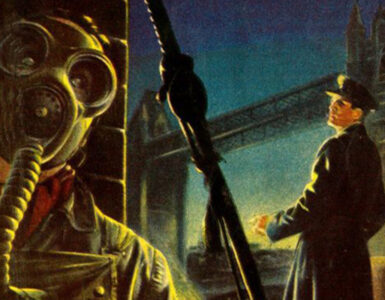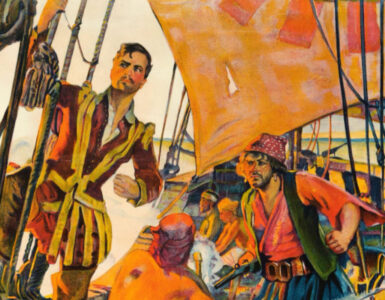
Not only does 2018 mark the centennial of the armistice that ended The First World War, it is also the hundredth anniversary of the birth of Grand Master of Science Fiction Philip José Farmer. Beginning on Thursday evening, July 26, and running through Sunday, July 29, PulpFest 2018 and its partner, FarmerCon 100, will honor both the 100th anniversary of the end of World War I AND the century mark of Philip José Farmer. We’ll be celebrating at the beautiful DoubleTree by Hilton Hotel Pittsburgh – Cranberry, just outside Pennsylvania’s Steel City.
Few people think of Philip José Farmer as a pulp writer, but he was a child of the pulps and launched his career in the pulps. Before trying his hand at science fiction, he wrote mainstream stories. He sold his first story, “O’Brien and Obrenov,” to ADVENTURE magazine. It was published in the March 1946 issue. His first science fiction story, “The Lovers” — published in the August 1952 STARTLING STORIES — is famous for breaking the taboo on sex in science fiction. It launched his science fiction career and won Farmer the 1952 Hugo Award as the “Most Promising New Talent.”
Over a long career, Farmer continued to write and sell science fiction short stories to such pulps and digests as AMAZING STORIES, ARGOSY, BEYOND FANTASY FICTION, FANTASTIC UNIVERSE, GALAXY, THE MAGAZINE OF FANTASY & SCIENCE FICTION, THE SAINT MYSTERY MAGAZINE, SCIENCE FICTION PLUS, STARTLING STORIES, THRILLING WONDER STORIES, WORLDS OF IF, and WORLDS OF TOMORROW. He also wrote novels and published stories in anthologies. In 1967, he won a second Hugo Award for the story “Riders of the Purple Wage,” published in DANGEROUS VISIONS. Farmer was also one of very few writers to win both the lifetime achievement award from the World Fantasy Society and the Grand Master Award presented by the Science Fiction Writers of America.
When Philip José Farmer died on February 25, 2009 at home in Peoria, Illinois, there were countless tributes on the author featured in such diverse forums as LOCUS MAGAZINE and Tor Books to CNN and THE NEW YORK TIMES. PulpFest 2018 guest of honor, Joe Lansdale, credited Farmer with changing the face of science fiction. “I just can’t begin to tell you how important he is to the field as well as other fields,” Lansdale said.
Farmer’s legacy endures and continues to entertain his many fans and readers. Perhaps the best testament to this is the annual FarmerCon gathering, held at PulpFest since 2011. This year, we’re very pleased to welcome our FarmerCon members back to our joint conference, particularly during the centennial year of Philip José Farmer’s birth. We’ll be celebrating the occasion with an expanded FarmerCon programming schedule.
On Friday, July 27, at 7 PM our FarmerCon programming continues with “100 Years of Philip José Farmer: His Influence and Legacy,” a panel featuring authors Joe Lansdale and Christopher Paul Carey, artist and illustrator Mark Wheatley, and FarmerCon co-founder and Meteor House publisher Mike Croteau. They’ll be discussing the importance of the author to the fields of science fiction and fantasy, as well as his importance to the many fans and readers of his work.
What better way to celebrate the 100th birthday of Philip José Farmer than by registering for Pulpfest 2018/FarmerCon 100? The Science Fiction Grand Master will be one of the main themes of the conventions, with plenty of programming about Farmer and his work. Also planned is a rare gallery showing of original art by acclaimed writer-illustrator Mark Wheatley, plus the conventions’ Guest of Honor — Joe Lansdale — the author of over forty novels, numerous short stories, and the introduction to THE BEST OF PHILIP JOSÉ FARMER. You can join both conventions by clicking the Register for 2018 button on the PulpFest home page. And don’t forget to book a room at the DoubleTree while you’re visiting the PulpFest site. They’re going fast!
(In the late 1990s, one of the local newspapers published an article on Philip José Farmer. It was illustrated by a picture of the author, seated in front of some of his book cases. The same photograph was used for Farmer’s obituary in THE DAILY TELEGRAPH, a national British daily founded by Arthur B. Sleigh in 1855.)







